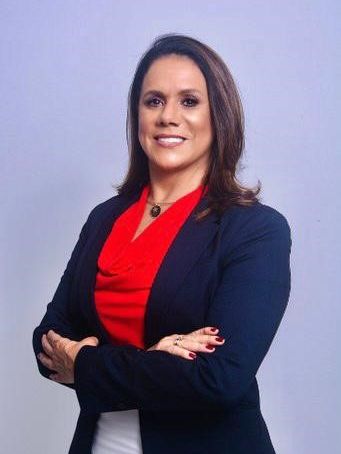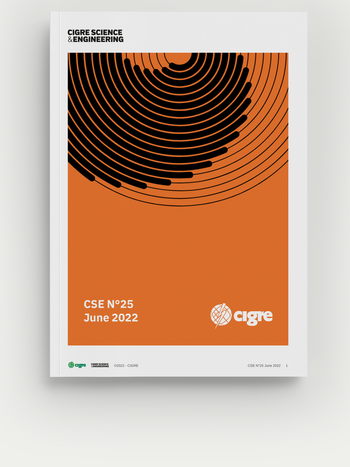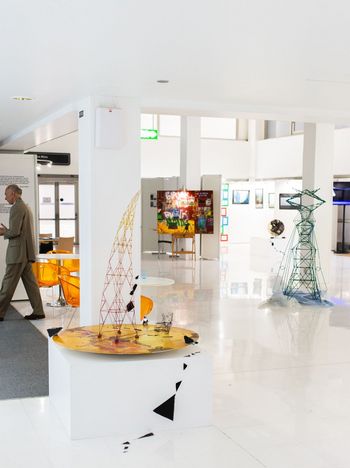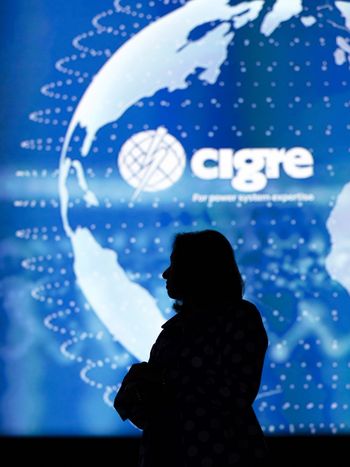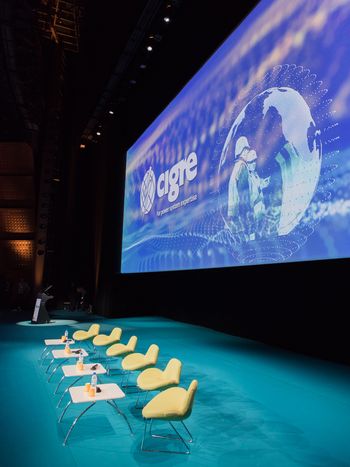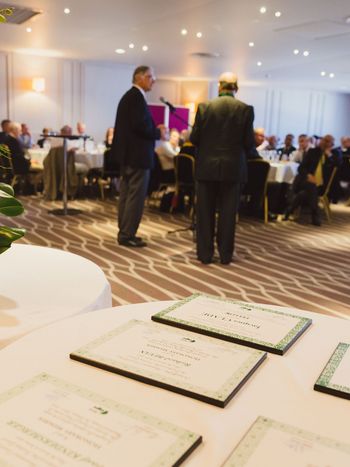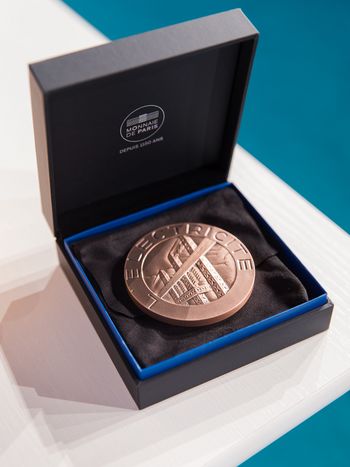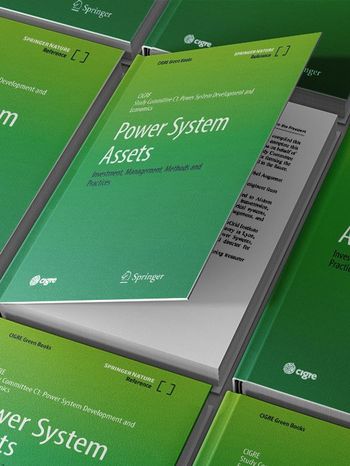Women in Energy & CIGRE Brasil - III forum - A Search for Equity and Integration
The Brazilian National Committee of CIGRE held the III Women's Forum on 17 May 2022, during the biggest event of CIGRE Brasil – The XXVI Seminar on Production and Transmission of Electric Energy (SNPTEE). This forum aimed to reinforce discussions about women participation in the electricity sector. Women presence has been growing gradually, although less than desired. And CIGRE Brasil could motivate by promoting an increase in the professional training of these women, sharing knowledge in a national and international network of specialists.
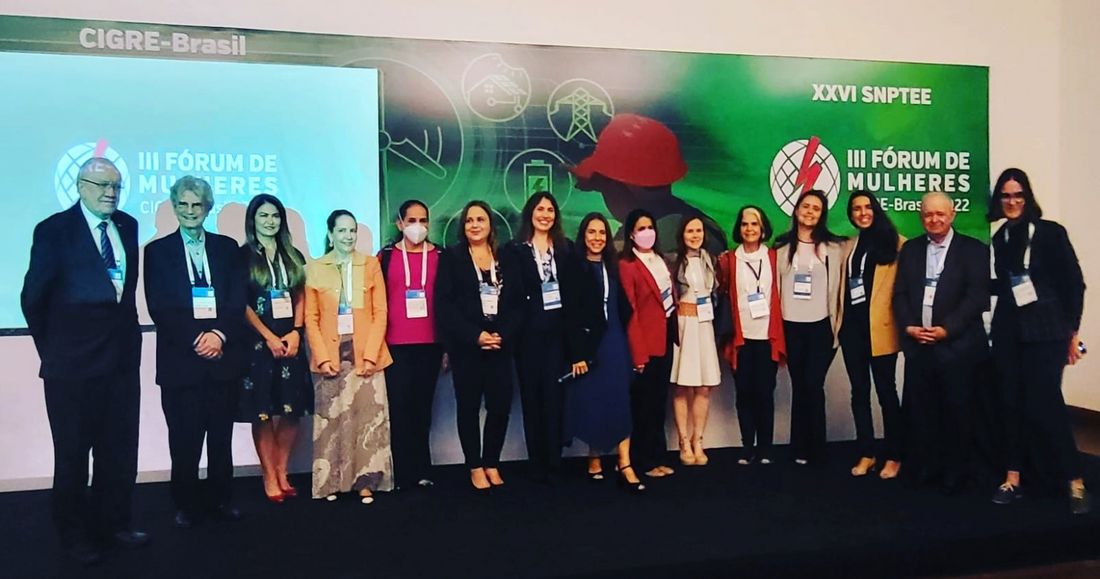
Brasil
17 May 2022
The Forum was inspired by the initiative of CIGRE during the Paris Session 2014 and since then CIGRE Brasil has promoted similar events in previous editions of SNPTEE, always looking forward to stimulate, value and integrate women's participation in CIGRE Brasil activities and in the Brazilian electricity sector.
In this edition, after the opening by the Director of Corporate Matters, chair of the Brazilian NC Women's Committee and organizer of this event, Carla Damasceno Peixoto, and the testimony of the President of CIGRE Brasil, Saulo Cisneiros, around 300 participants, including women and men, attended the presentations of four exponent women specialists.
Professor Yona Lopes, Doctor of Computing and Professor of Fluminense Federal University (UFF) Electrical Engineering Department; Marcia Nascimento, Operation Center Manager of the Production and Transmission Utility Furnas; Gabriela Desirê, Operation Director Transmission Utility ISA CTEEP; and Rosimar Lanza, Regional Manager of Latin America high and extra high voltage at Prysmian Group; followed by the debate initiated by the young engineering student and Elecnor professional trainee, Mayara Santos.
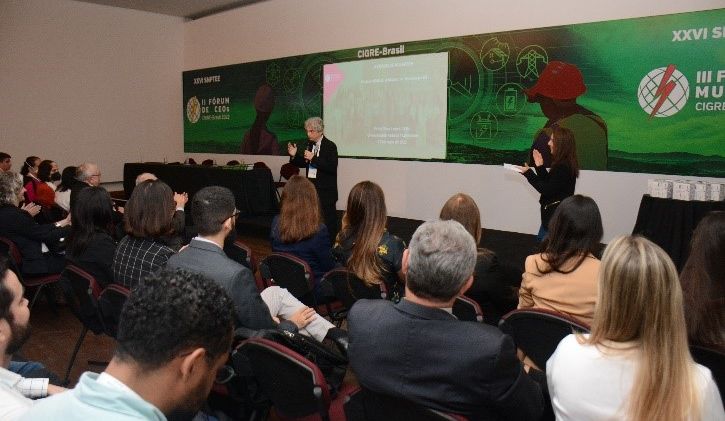
Testimony of the CIGRE Brasil President, Saulo Cisneiros
Professor Yona Lopes presented the 5GIRLS project that seeks to stimulate the participation and training girls and women for the careers of the Science, Technology, Engineering and Mathematics (STEM), through the study of 5G technology for applications in the electrical system. This project has been developed within the academic environment in partnership with the industry and has already achieved great results - among them the work of master's student Joyce Meirelles who received NGN award at the XXVI SNPTEE. Carlos Chagas Filho Foundation, the research support center that promotes science, technology and innovation in Rio de Janeiro State (FAPERJ), finances the 5GIRLS project, which also has the support of private partners in addition to the Fluminense Federal Institute (IFF) and the Federal Center for Technological Education (CEFET). It is composed of professors and students from the institutions involved. This project also includes with men participation. One of the highlights of the project is the awareness of both women and men. Professor Yona indicated that sensitivity in personal relationships and emotional intelligence are very useful tools for women in driving to change this vision. "Often the problem is so entrenched that one does not realize the obstacle caused by the wrong choice of words and expressions." She pointed out that the project intends to reach young participants from technical education to graduate school in the expectation that the new generation will be more conscious and able to go much further, leading to integration and diversity of the team - "together we are stronger!".
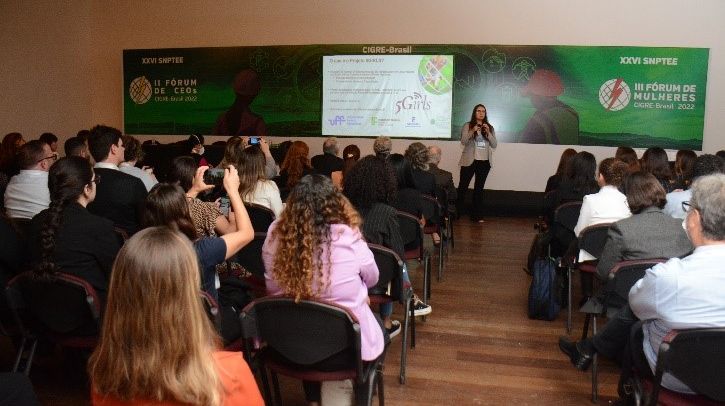
PHD Yona Lopes speaking to the III BR NC Women's Forum audience
Marcia Nascimento spoke about her experience in the direct management of an Electrical System Operation and Telecommunications Supervision team during the pandemic scenario and learned a lot facing all kind of challenges. "Managing technical activities and also providing emotional support to professionals during critical periods was very exhausting and reinforced the importance of knowing the team and the characteristics of each one." She considers that it is important in the exercise of a management the search for the balance between producing for the company without leaving aside respect for the people. Working in a still mostly male environment, Marcia sees no difference between dealing with men or women and considers a lot of advantages of the profile’s diversity of the group. She also knows that women's access to the market can be more difficult, but that women should be persistent, seeking their goals with focus and dedication to reach results. Marcia brought promising figures from her company towards equity: "Today, 21% of management positions at Furnas are women, while the average of the Brazilian electricity sector in this type of position reaches around 6%. That good result is no accident. For years, the company has invested in increasing female participation in leadership positions," she said.
The speaker Gabriela Desirê, presented her professional trajectory and the challenges faced in the search for opportunities in a mostly male environment, the breaking labels, the recognition for technical attributes, the reach of representativeness and the importance of the female support network. Despite the growing female participation, Gabriela highlighted the need for increasing it, as today women participate only with 22% in the electricity sector, according to data from the International Renewable Energy Agency (IRENA), and only 6% in decision positions, according to the publication of FESA Executive Search, which is the leader in the executive recruitment market in Brazil. According to a study by the Brazilian Institute of Corporate Governance (IBGC), among 295 companies evaluated, almost 25% do not have any women in management or board positions. He also highlighted the importance of a closer and new look, as innovation in the electricity sector goes beyond gender. According to Gabriela, the research by McKinsey Consulting in Latin America, showed that companies that invest in gender, race and sexual orientation diversity surpass non-diverse companies, because there is a greater stimulus of employee performance and innovation practices.
The fourth speaker, Rosimar Gasparotto, also emphasized the theme of innovation tied to diversity. He pointed out that diversity in the work environment promotes cultural change, makes people review concepts, reflect on their professional and personal positioning, reducing discriminatory attitudes and contributing to the exhibition of ideas - which generates innovation for the company or organization. In her words, an era of so many innovations and changes, as in the case of the energy transition, renewable sources, and the digitization of work driven by the pandemic, it is essential to promote new programs that allow a faster insertion of women in the Electricity Sector. Rosimar also brought effective actions to change the current scenario and increase the participation of women in the electricity sector: diagnosis and awareness of senior management; training of leaders to sponsor inclusion; holding internal events at all levels to disseminate the culture of diversity; actions in conjunction with the company's Human Resources area to increase the visibility and advantages of women positions for the market and universities; definition of goals and metrics for the effective increase in the number of women in the STEM market and in leadership positions; development and retention programmes for women and new policies on working arrangements. She ended his speech with the phrase: "I feel that each of us, women, firm and determined, knowing this market so well, we have the duty to act so that women who want to contribute to this sector are very welcome and valued!"
Following the speakers, the debate was initiated by the young professional Mayara Helena dos Santos, a graduate student in Electrical Engineering at the Fluminense Federal University, researcher at FRIENDS Lab in the 5GIRLS project and Elecnor trainee in Protection, Control and Supervision of Substations. Mayara had the opportunity to talk about his experience about searching for space in the market, and in addition addressed questions to the fourth speakers, such as their advice for early career professionals and greater challenges faced. Member of CIGRE Brasil, she pointed out that the opportunity to exchange with other professionals provided by this organization is extremely relevant for the development of young professionals.
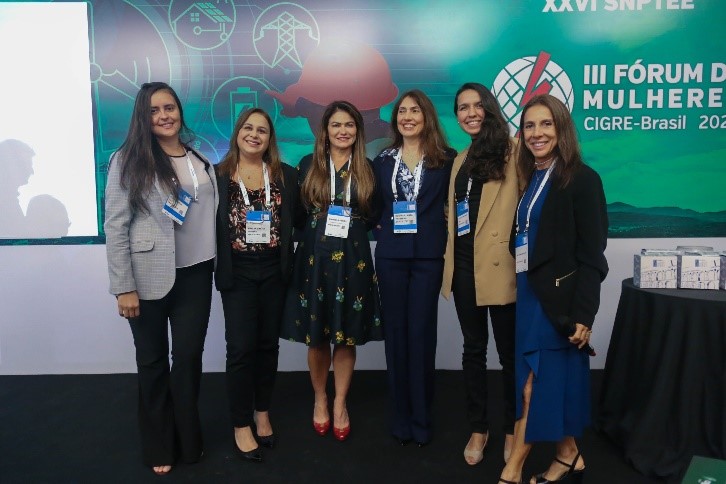
The speakers of III FM, Yona Lopes, Marcia Simões, Gabriela Desirê, Rosimar Gasparotto; the young student Mayara dos Santos and the BR NC Director of Corporate Matters, Carla Damasceno Peixoto
In front of the presence of a large, diverse and participatory audience, it was possible to observe that there is growing interest in female integration in the electricity sector and that joint action between women and men leads to teams of greater competence, resulting in higher technical quality work and, consequently, better financial performance for companies and organizations.
XXVI SNPTEE and III WiE Forum Feedbacks
The III Women's Forum of CIGRE Brasil had the honor of welcoming 2 young professionals present at the audience, Joyce Siqueira and Camila Maciel. Both young women examples of innovative strength gave their testimony about their trajectories and inspirations.
Joyce Meireles Siqueira
"Participating in the XXVI SNPTEE was an amazing experience. I had the opportunity to present my work together with 5GIRLS project in the NGP (New Generation of Professionals) block and I thank CIGRE Brasil very much for encouraging the participation of young professionals in an event of this importance.
In addition, another highlight in my opinion was the III Women's Forum. It was great to listen to some of the experience of amazing women in the electrical industry was inexplicable. I remember when I was in the university and was able to attend to a presentation by the engineer Carla Damasceno, nowadays one of BR NC Director, about underground transmission lines and that moment was a milestone in my career vision, because I was able to be inspired by a female example inserted in such a technical and complex area. Therefore, I believe that the representativeness and encouragement generated by these forums and speeches are essential to encourage our girls and women to enter and remain in the electricity sector."
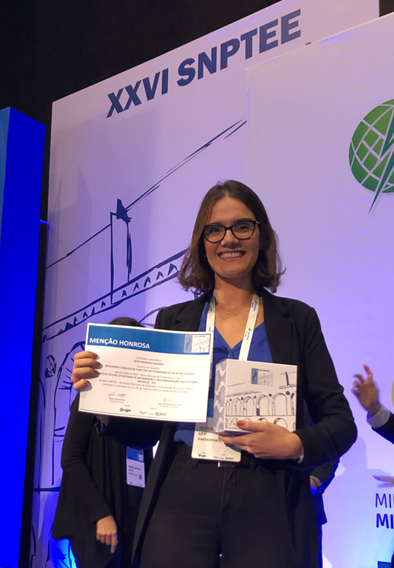
Joyce Meireles Siqueira, one of the NGNs’ awarded at XXVI SNPTEE
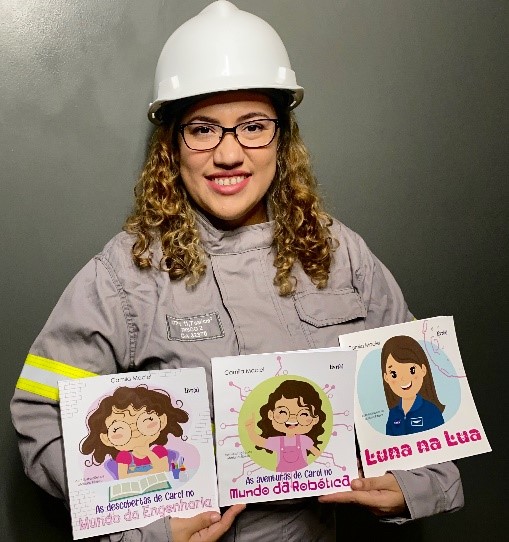
Camila Maciel, an engineer and writer of children' books inspiring girls since childhood to STEM careers
Camilla Maciel
"Seeing the III Women's Forum held by CIGRE Brasil during the XXVI SNPTEE with crowded room only demonstrates how important events like that are introducing as central theme women professionals, especially those who have built their careers in sectors that still have little women presence. I had already participated in the II Forum and was looking forward a new forum edition. I got very happy to see announced on Instagram that it would take place a third edition during the XXVI SNPTEE. Both the II and III BR NC WIE Forum made me reflect on what we can change or do to contribute to the increase in female participation in the electricity sector, especially the opportunity to connect several generations of female professionals, to be able to learn from those who opened the doors of this sector, and even if we are still few it is always good to remember that we are not alone.
My career in the electricity sector is directly linked to the execution, in my 11 years of work in engineering I built substations from North to South of Brazil literally, and I count on the fingers the few women who had the opportunity to share the energy construction sites.
I wondered, what I could do to change this reality. I started talking about my career for the future generation of engineers when speaking at universities, and some students told me that they did not imagine the career of a site engineer as a possible option for them, even with a lot of desire to work in this area. Sometimes there is no incentive within girls own family when they decided to do engineering or some technical course. At this point I have realized how important it was to tell real stories to encourage the next generation, and I decided to create a project to inspire them. That is why a I have started to write children’ books, where I tell stories about women professionals working in the site in areas of very little women presence.
Besides being an electricity engineer, I am also a writer, and I believe in the transformative power of the books."


